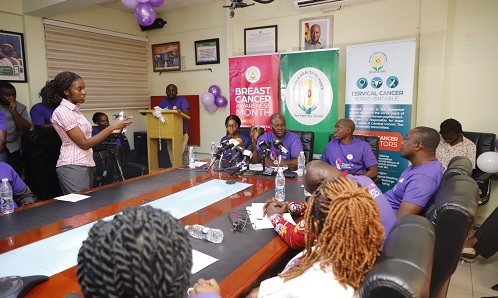The Ghana Health Service (GHS) has said that prostate and liver cancers are among the leading causes of death in the country.
In 2022, a total of 2,395 cases of prostate cancer were recorded in the country, with 1,233 deaths, representing 52 per cent mortality while liver cancer affected a total of 2,656 men in 2022, with 2,390 deaths, representing 90 per cent mortality.
Also, an estimated number of all new cancer cases recorded in 2022 was 27,385, with 17,944 deaths, while about 63,764 persons survived the disease in the country.
The GHS has, therefore, stressed the need for people to get tested for the conditions at least once in a year so that cases could be picked up early for treatment.
It assured the public that prevention, early detection programmes and life-saving interventions were available across the country.
The acting Director-General of the service, Dr Samuel Kaba Akoriyea, said this at a media briefing in Accra yesterday as part of activities to commemorate this year’s World Cancer Day celebration on the theme: “United in unique.”
February 4, every year is celebrated globally as World Cancer Day to highlight the shared vision of raising awareness of cancer to encourage its prevention, early detection and treatment.
Prostate and liver cancers
Dr Akoriyea said that this year, the GHS was shining light on cancers in males, especially prostate and liver cancers.
He appealed to the media and development partners to help create more awareness and sensitisation to the need to eat healthy diets, undergo physical activities and also vaccinate against hepatitis A and B, which he explained, were proven effective means of preventing cancers.
Dr Akoriyea also stressed the need to invest in cancer research and improve care and advocacy on prevention, including the creation of adequate social support systems for persons diagnosed with cancer.
“At the heart of this urgent call to action are people - survivors who inspire us with their stories of resilience, caregivers who dedicate their lives to cater for persons diagnosed with cancer, healthcare workers on the front line and partners such as the media who continue to support the call to improve cancer care.
“Each one of us can do a lot, whether in raising awareness, supporting a loved one, contributing to research or advocating policies that prioritise cancer care. Together, we can create a ripple effect that transforms lives,” he said.
Survivor
The highlight of the celebration was when a cancer survivor, who is also a health worker, Hannah Tetteh, shared a harrowing story of how she was first diagnosed with a brain tumour - multiple meningiomas cancer-- her refusal to initially do the surgery to remove the tumour which later multiplied, the huge cost involved in the entire treatment, the painful nights she had to endure and the people who came on board to support her financially to go through two surgeries and therapy.
She asked cancer patients not to give up or do self-medication but must continue to take their medication.
“Stay connected to your doctor and your prescription. Don’t change your prescription because somebody with a tumour took a particular medication that worked for them,” she advised.
Ms Tetteh further entreated families to support members to go through such conditions and appealed to the government to put in place measures to reduce the cost of cancer treatment in the country.

